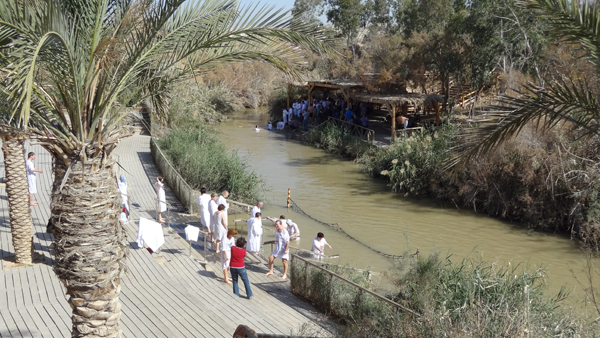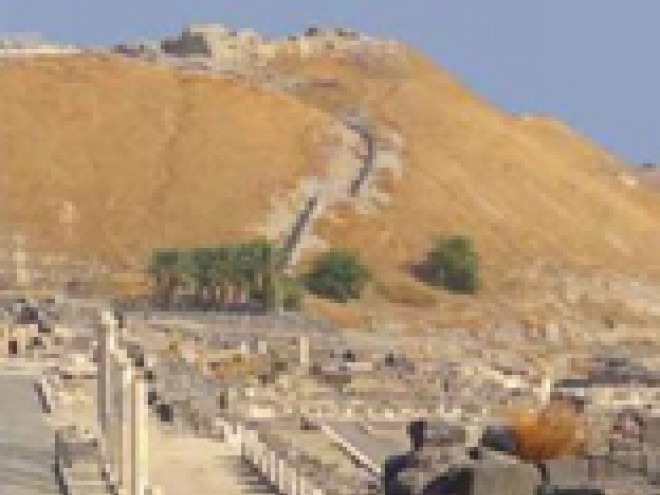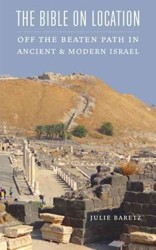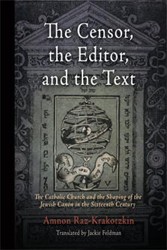Earlier this week, Julie Baretz wrote about why she decided to make aliyah. Her book, The Bible on Location: Off the Beaten Path in Ancient and Modern Israel, is now available. She will be blogging here all week for Jewish Book Council’s Visiting Scribe series.
A man once got on a bus I was riding in Israel. He greeted the driver and a conversation ensued. Rapidly, however, the tones escalated until the two gentlemen were bellowing at each other. I didn’t speak much Hebrew at the time, but it looked like the passenger was about to sock the driver in the teeth. Yet, when we reached the next stop the tension evaporated as quickly as it had materialized. The driver opened the door, the two men shook hands and the passenger alighted with an amicable wave. I then realized I had just witnessed a thrilling round of Israel’s favorite national sport – the friendly argument.
A major impetus for writing my book, The Bible on Location, has been my work guiding Christian pilgrims in Israel. Christians who come to experience the Holy Land and walk in the footsteps of Jesus comprise about 70 percent of incoming tourism — bread and butter for Jewish tour guides. I work frequently with American evangelicals; they are fervently interested in the context of Christian scripture and anything that will shed light on the Israel and the Judaism that Jesus knew. But their interest is not limited to the Gospels; they are just as passionate about Hebrew scripture. Most of them know the Tanakh very, very well; way better, in fact, then most Jews. Many of them have read it numerous times from cover-to-cover and almost all of them attend Bible study groups at their churches.

Jordan River Baptismal Site
How embarrassing it was, then, for me to realize that my Jewish smarts didn’t count for bupkis if I was only superficially acquainted with my own family history, the same one which the gentiles had so warmly adopted as their own. Serious study was in order, so I found myself a rabbi and together we dove deeply into the biblical texts. I was so intrigued by the timelessness of the biblical characters and by the endless associative modern parallels, that early on in the study process I knew I wanted to share my discoveries by writing a book. Meanwhile, I honed my commentary on my Christian pilgrims.
It’s been said that for Christians the Bible is the last word, while for Jews it’s the first. Jews like to question, to deconstruct, to dissect the biblical personalities, to up-end assumptions. In the attempt to crack the true meaning of a text we relish a difference of opinion and delight in debate. The smart aleck is king and there’s nothing we love more than a good argument l’shem shamaim, for heaven’s sake. But before I can spin an irreverent riff on Elijah the over-zealous prophet or the conniving, skirt-chasing murderer King David, I must first expound on the roots of our tradition to my gentile audience. That’s when I call on the undefeated champion of challenge, the super-hero of squabble, the Hebrew hammer of haggling: Abraham.
Abraham was fearless. When God threatened to destroy the wicked people of Sodom and Gomorrah in Genesis 18, Abraham called him on it. “What if there are fifty righteous people there – will you sweep away the innocent with the guilty?” God conceded and Abraham boldly bargained Him down to a far better deal, convincing Him to save the two corrupt cities for the sake of a mere ten righteous people. This well-known and beloved story helps to explain that when justice is at stake, not only are we permitted to argue with the Creator, but we are obligated to do so. Hence our Jewish penchant for noisy disagreement. It’s helpful to point out that Jesus was a man of this culture; living at a time when Jewish law had not yet been finalized, he took an active part in the national discussion on how to interpret and understand the Torah.
After giving this explanation about Jews and arguing recently, a young pastor approached me with a concerned look on his face. It seemed he had something important to say. He took me aside. “Julie,” he said. “I think my wife is Jewish.”
Julie Baretz received her license from the Israel Government Tour Guides training program in 1987. Since then she has guided thousands of Jewish and Christian visitors to sites all around the country. Read more about her and her work here.
Related Content:
- Digging Through the Bible: Understanding Biblical People, Places, and Controversies Through Archaeology by Richard A. Freund
- A Match Made in Heaven: American Jews, Christian Zionists, and One Man’s Exploration of the Weird and Wonderful Judeo-Evangelical Alliance by Zev Chafetz
- A Literary Bible: An Original Translation by David Rosenberg
Julie Baretz received her license from the Israel Government Tour Guides training program in 1987. Since then she has guided thousands of Jewish and Christian visitors to sites all around the country. Her book, The Bible on Location: Off the Beaten Path in Ancient and Modern Israel, is now available. Read more here.


